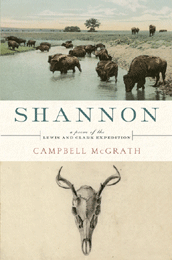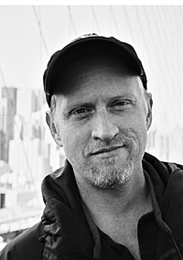An American Epic
Air Date: Week of June 26, 2009

In 1804, the youngest member of the Lewis and Clark expedition got lost in the Great Plains for 16 days. Today, poet Campbell McGrath gives voice to the young man and his imagined adventures in a new epic, "Shannon: A Poem of the Lewis and Clark Expedition." Host Steve Curwood talks with McGrath about his hero's triumphs and losses as he wanders the prairie alone, among buffalo herds and under the big Western sky.
Transcript
[MUSIC: The Movie Screen Orchestra “Dances With Wolves” from Music From The Westerns (Marathon 2008)]
MCGRATH: Fair set windless, fine and warm.
CURWOOD: Poet Campbell McGrath reading from his new epic, “Shannon: a Poem of the Lewis and Clark Expedition.”
MCGRATH: Clouds at dawn resembling raked embers now diminished nor any wisp to be seen having never conceived a sky so grand as this I wonder if the western ocean truly resembles the accounts Captain Lewis has given, could it be larger still?
CURWOOD: That’s the voice Campbell McGrath imagines for George Shannon – a teenager on Lewis and Clark’s great trek of discovery, charting rivers and mountains and animals across what would become the western half of America.
MCGRATH: George Shannon is just the guy who I fell in love with – in that big grand epic adventure with major heroic figures, George Shannon was kind of like a goofy kid, along for the ride. He was the youngest of the guys of the Lewis and Clark expedition. He was only a teenager, eighteen years old and he had the misfortune to get lost.

Poet Campbell McGrath.
MCGRATH: So after he manages to kill one deer, he’s out of luck. They only had their kind of day’s ration of bullets with them, so he basically survives on pawpaws, plums, berries, currants and slowly feels himself slipping toward starvation.
CURWOOD: Things may be tough, but he rather sets himself some pretty high ambitions.
MCGRATH: Well they’re his ambitions and also there are his father’s ambitions. His father is clearly an ambitious man. So he imagines his father talking to him as he’s speculating on you know politics and the republic “Well, do I know what my father would respond to fancies such as these. Idleness of mind need not be wasted time, George, my boy, if taken up with suitable ambition. George, my boy, if politics be the topic, why not see fit to dream upon President Shannon.”
[LAUGHING]
MCGRATH: So there’s – I don’t suppose every—in other words every eighteen year olds frontiersman was imagining he might be President. It’s the strange fate, though, that Shannon went on to have a very notable political career as did three of his younger brothers, all of these guys being kids who grew up in a log cabin in the frontier. Shannon was a Congressperson in Kentucky. Then he ran for United States Senate in Missouri. So, you know, there was something about this kind of wide open character of the early nineteenth century that often had crazy ambitions, and yet often amazingly realize them.
CURWOOD: Throughout the story of George Shannon, buffalo are – well they’re kind of like these mythical creatures. Shannon is so anxious to see them. And out in the wild on his own, he finally does see them, again and again, big herds of buffalo.
MCGRATH: The Lewis and Clark expedition were actually really interested in finding buffalo, but they had never actually seen one. So Shannon, you know, really is eager for the first day or two he’s like were are they. But then before a few more days had passed, he’s amazed that he could, you know, ever had wished to see a single buffalo when he’s surrounded by tens of thousands.
CURWOOD: So Campbell McGrath, I’d like you to read from where George Shannon describes the buffalo. What is going on in his mind at this point when he describes the buffalo herd?
MCGRATH: This is day fourteen or so. He’s been alone for fourteen days. He’s very hungry. He’s lonely and he’s kind of lost himself a little bit in the landscape. It’s like instead of Shannon discovering the country, the country’s kind of discovering and colonizing him in this strange way. And he almost, you know, loses himself in a trance to the buffalo herd.
“Animals in the darkness, all around me. Huffing and lowing of the buffalo. Sound of their lungs steaming into the light. I am not alone in the darkness. Buffalo. Buffalo. Buffalo. Buffalo. Buffalo. Buffalo. Still dark, but not alone, the great herds pulsing all around me in the darkness, snort and exhalation, stomp and low. Beards of saliva, tongue and forelock rustle in the grass of the buffalo gathering. Heavy stamp of hooves and bodies of the buffalo. Fur thick with burs of brome and sedge grass. Hump rumble. Herd wallow. Gruff in the darkness. Smell of the buffalo strong on the river breeze. Black eyes wide as the western ocean. Great herds of the buffalo all around me. Buffalo. Buffalo. Buffalo. Buffalo. Buffalo. Buffalo. Buffalo. Buffalo. Buffalo. Buffalo. Buffalo. Buffalo. Buffalo. Buffalo. Buffalo. Buffalo. Buffalo. Buffalo. Buffalo. Buffalo. Buffalo. Buffalo. Buffalo. Buffalo. Buffalo. Buffalo. Buffalo. Buffalo. Buffalo. Buffalo. Buffalo. Buffalo. Buffalo. Buffalo. Buffalo. Buffalo. Buffalo. Buffalo. Buffalo. Buffalo. Buffalo. Buffalo. Buffalo. Buffalo. Buffalo. Buffalo. Buffalo. Buffalo. Buffalo. Buffalo. Buffalo. Buffalo. Buffalo. Buffalo. Buffalo. Buffalo. Buffalo. Buffalo. Buffalo. Buffalo. Buffalo. Buffalo. Buffalo. Buffalo. Buffalo. Buffalo. Buffalo. Buffalo. Buffalo. Buffalo. Buffalo. Buffalo. Buffalo.
Herds and eyes all around me in the darkness. Buffalo in the dawn light breathing, whispering, I am the buffalo god. I am the buffalo god. Behold my kingdom.”
CURWOOD: It is so strange that here this young man is nearly starving to death and the land is so abundant.
MCGRATH: Yeah, and I guess you can only go so far on handfuls of, you know, river grapes. But nonetheless he had this endless kind of resource of intelligence and imagination and enterprise and courage to endure what he did. And, you know, at one point he says, “In the land of plenty, I travel hungry. In a country of herds, I wonder alone. On a journey of discovery, I am the lost.”
CURWOOD: You know, there is something kind of sad about both the innocence of George Shannon and really of this land unspoiled, these vast buffalo herds that we know are gonna be gone in not too long after the Lewis and Clark expedition if you think about it.
MCGRATH: Absolutely true. That’s one of the things that is really interesting about reading those, you know, the first hand testaments of – whether its Lewis and Clark or William Bartram or the explorers back then, late 18th century, early 19th century, is we all know where the story’s headed in the longer run. We all know that a vision of exploiting nature is where the country’s going. But so you can at that moment at least still kind of believe in, you know, the possibilities of cherishing the landscape and you can recognize that both of these tendencies continue in American culture, you know, the exploitative as well as the celebratory, and you have to kind of continue to root for the right one.

MCGRATH: You know, Shannon thinks he’s done for. ‘Cause when he gets back to the river, he sees: wow, they’re not here. I really need to hurry to catch up with these guys. Of course, the irony is he’s catching up to people who are behind him. So all the time he’s racing upstream, he’s getting further away from them. And eventually he kind of basically gives up and just stops and sits down by the river. And these are his final thoughts.
“I doubt not but my countrymen will populate in numbers these fulsome plains, but what untold count of years and men, of decades and centuries, what numberless generations will it require, life by life and skeleton by skeleton to claim this land from the buffalo. Who finds this body, be it known, my name is George Shannon. And I bequeath my remains to seed this land with American bones.”
CURWOOD: Campbell, thank for very much.
MCGRATH: Thank you very much. It’s been a real pleasure to be here.
CURWOOD: Campbell McGrath is a poet and writer. He teaches at Florida International University, and his new book is called “Shannon: a Poem of the Lewis and Clark Expedition.”
[MUSIC: The Movie Screen Orchestra “Dances With Wolves” from Music From The Westerns (Marathon 2008)]
Links
For more on poet Campbell McGrath and his epic, “Shannon,” click here.
Living on Earth wants to hear from you!
Living on Earth
62 Calef Highway, Suite 212
Lee, NH 03861
Telephone: 617-287-4121
E-mail: comments@loe.org
Newsletter [Click here]
Donate to Living on Earth!
Living on Earth is an independent media program and relies entirely on contributions from listeners and institutions supporting public service. Please donate now to preserve an independent environmental voice.
NewsletterLiving on Earth offers a weekly delivery of the show's rundown to your mailbox. Sign up for our newsletter today!
 Sailors For The Sea: Be the change you want to sea.
Sailors For The Sea: Be the change you want to sea.
 The Grantham Foundation for the Protection of the Environment: Committed to protecting and improving the health of the global environment.
The Grantham Foundation for the Protection of the Environment: Committed to protecting and improving the health of the global environment.
 Contribute to Living on Earth and receive, as our gift to you, an archival print of one of Mark Seth Lender's extraordinary wildlife photographs. Follow the link to see Mark's current collection of photographs.
Contribute to Living on Earth and receive, as our gift to you, an archival print of one of Mark Seth Lender's extraordinary wildlife photographs. Follow the link to see Mark's current collection of photographs.
 Buy a signed copy of Mark Seth Lender's book Smeagull the Seagull & support Living on Earth
Buy a signed copy of Mark Seth Lender's book Smeagull the Seagull & support Living on Earth

